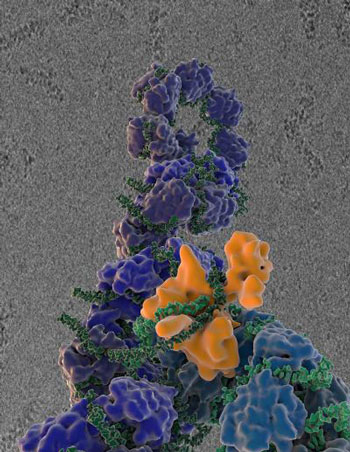 Scientists at The Scripps Research Institute (TSRI) have made a major advance in understanding how flu viruses replicate within infected cells. The researchers used cutting-edge molecular biology and electron-microscopy techniques to "see" one of influenza's essential protein complexes in unprecedented detail.
Scientists at The Scripps Research Institute (TSRI) have made a major advance in understanding how flu viruses replicate within infected cells. The researchers used cutting-edge molecular biology and electron-microscopy techniques to "see" one of influenza's essential protein complexes in unprecedented detail.
Nov 25th, 2012
Read more
 In an experiment performed on oilseed rape, scientists use RNAi suppression as a tool to switch off the enzyme responsible for oil breakdown, specifically for the duration of seed development. This results in the accumulation of around 8% more oil in the seed.
In an experiment performed on oilseed rape, scientists use RNAi suppression as a tool to switch off the enzyme responsible for oil breakdown, specifically for the duration of seed development. This results in the accumulation of around 8% more oil in the seed.
Nov 25th, 2012
Read more
A team led by IRB Barcelona's David Rossell and Patrick Aloy and by Anaxomics Biotech ranked among the best in the world for diagnosing and classifying patients in a blind test for four diseases.
Nov 23rd, 2012
Read more
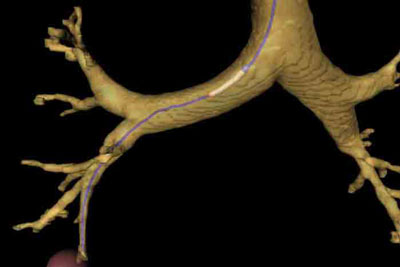 Systems to improve patient rehabilitation, methods that help detect diseases, and smart biomaterials for optimising treatments - scientific advances in the field of biomedical engineering are unstoppable. A number of leading UPC teams are carrying out research aimed at harnessing technology to improve people's health.
Systems to improve patient rehabilitation, methods that help detect diseases, and smart biomaterials for optimising treatments - scientific advances in the field of biomedical engineering are unstoppable. A number of leading UPC teams are carrying out research aimed at harnessing technology to improve people's health.
Nov 22nd, 2012
Read more
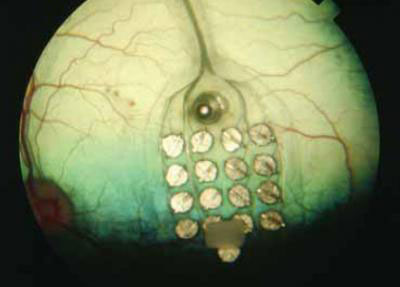 For the very first time researchers have streamed braille patterns directly into a blind patient's retina, allowing him to read four-letter words accurately and quickly with an ocular neuroprosthetic device.
For the very first time researchers have streamed braille patterns directly into a blind patient's retina, allowing him to read four-letter words accurately and quickly with an ocular neuroprosthetic device.
Nov 22nd, 2012
Read more
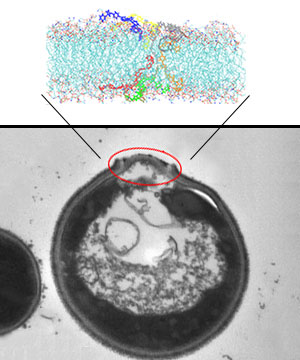 Our antibiotic armory is set to benefit from the development of short-chain synthetic polymers with potent efficacy against multidrug-resistant microbes.
Our antibiotic armory is set to benefit from the development of short-chain synthetic polymers with potent efficacy against multidrug-resistant microbes.
Nov 21st, 2012
Read more
 A signaling receptor that aids bacterial communication may provide a target for reducing virulence without antibiotics.
A signaling receptor that aids bacterial communication may provide a target for reducing virulence without antibiotics.
Nov 21st, 2012
Read more
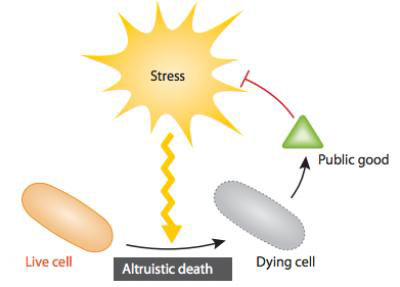 Scientists have engineered bacteria that are capable of sacrificing themselves for the good of the bacterial population. These altruistically inclined bacteria can be used to demonstrate the conditions where programmed cell death becomes a distinct advantage for the survival of the bacterial population.
Scientists have engineered bacteria that are capable of sacrificing themselves for the good of the bacterial population. These altruistically inclined bacteria can be used to demonstrate the conditions where programmed cell death becomes a distinct advantage for the survival of the bacterial population.
Nov 20th, 2012
Read more
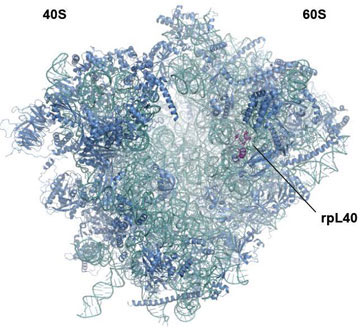 Ribosome regulates viral protein synthesis, revealing potential therapeutic target.
Ribosome regulates viral protein synthesis, revealing potential therapeutic target.
Nov 20th, 2012
Read more
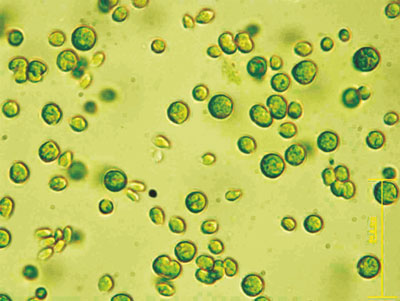 Scientists have confirmed for the first time that a plant, the green alga Chlamydomonas reinhardtii, not only engages in photosynthesis, but also has an alternative source of energy: it can draw it from other plants. This finding could also have a major impact on the future of bioenergy.
Scientists have confirmed for the first time that a plant, the green alga Chlamydomonas reinhardtii, not only engages in photosynthesis, but also has an alternative source of energy: it can draw it from other plants. This finding could also have a major impact on the future of bioenergy.
Nov 20th, 2012
Read more
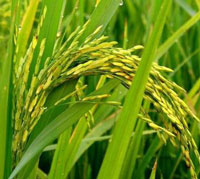 Researchers from the UK, USA and India, led by scientists at the University of York, are embarking on a major four-year project which aims to develop new strains of rice to help to feed millions of people.
Researchers from the UK, USA and India, led by scientists at the University of York, are embarking on a major four-year project which aims to develop new strains of rice to help to feed millions of people.
Nov 20th, 2012
Read more
Certain mutated cells keep trying to replicate their DNA - with disastrous results - even after medications rob them of the raw materials to do so.
Nov 19th, 2012
Read more
The PEPCHIPOMICS project, which is supported by the Seventh Framework Programme for Research and Technological Development (FP7) of the European Union, is aimed at synthesising and reading very high-density peptide microarrays.
Nov 19th, 2012
Read more
An international research team led by Nanjing Agricultural University and BGI, has completed the first genomic sequence of pear by an approach using the combination of BAC-by-BAC strategy and next-gen sequencing. The pear genome not only provides an invaluable new resource for breeding improvement of this important crop, but also sheds new light on the genome evolution and other genome-wide comparative studies.
Nov 19th, 2012
Read more
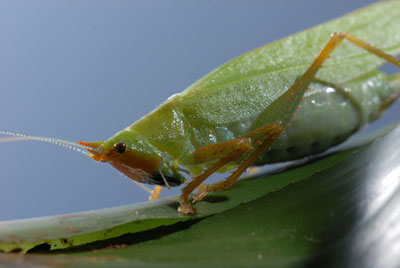 The discovery of a previously unidentified hearing organ in the South American bushcrickets' ear could pave the way for technological advancements in bio-inspired acoustic sensors research, including medical imaging and hearing aid development.
The discovery of a previously unidentified hearing organ in the South American bushcrickets' ear could pave the way for technological advancements in bio-inspired acoustic sensors research, including medical imaging and hearing aid development.
Nov 16th, 2012
Read more
The money will help researchers in the Institute of Molecular, System and Cell Biology at the University of Glasgow to simplify the process of designing, building, testing and modifying biological systems like bacteria for a variety of useful purposes.
Nov 15th, 2012
Read more
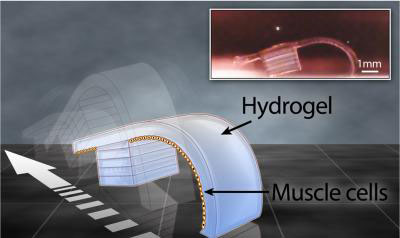 They're soft, biocompatible, about 7 millimeters long ? and, incredibly, able to walk by themselves. Miniature "bio-bots" developed at the University of Illinois are making tracks in synthetic biology.
They're soft, biocompatible, about 7 millimeters long ? and, incredibly, able to walk by themselves. Miniature "bio-bots" developed at the University of Illinois are making tracks in synthetic biology.
Nov 15th, 2012
Read more
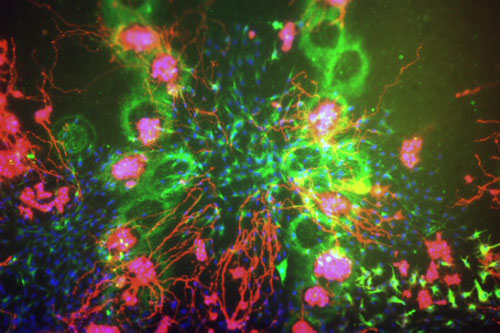 Scientists are one step closer to being able to print tissue replacements for diseased or damaged body parts using inkjet printers, thanks to the development of a specialised ink formulation.
Scientists are one step closer to being able to print tissue replacements for diseased or damaged body parts using inkjet printers, thanks to the development of a specialised ink formulation.
Nov 15th, 2012
Read more
 Scientists at The Scripps Research Institute (TSRI) have made a major advance in understanding how flu viruses replicate within infected cells. The researchers used cutting-edge molecular biology and electron-microscopy techniques to "see" one of influenza's essential protein complexes in unprecedented detail.
Scientists at The Scripps Research Institute (TSRI) have made a major advance in understanding how flu viruses replicate within infected cells. The researchers used cutting-edge molecular biology and electron-microscopy techniques to "see" one of influenza's essential protein complexes in unprecedented detail.
 Subscribe to our Biotechnology News feed
Subscribe to our Biotechnology News feed










